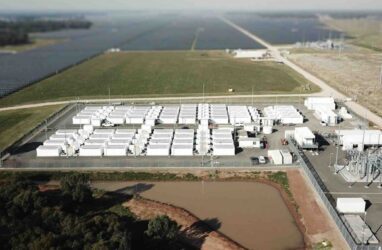Feed aggregator
Australia’s environment could be fixed and threatened species saved for just 0.3% of GDP, experts say
Wentworth Group of Concerned Scientists estimates $7.3bn a year for 30 years could avoid most extinctions, repair soils and restore rivers
- Follow our Australia news live blog for latest updates
- Get our morning and afternoon news emails, free app or daily news podcast
Saving Australia’s threatened wildlife, repairing degraded land and restoring ailing river systems is possible and would cost just 0.3% of Australia’s GDP, according to a new blueprint produced by more than 60 experts.
For the first time scientists, governance and business leaders have produced a dollar estimate of what it would take to fix Australia’s environment.
Continue reading...Yes, Australia’s environment is on a depressing path – but $7 billion a year would transform it
Equis wins connection deal for a 4 hour battery in Queensland
The post Equis wins connection deal for a 4 hour battery in Queensland appeared first on RenewEconomy.
Massive solar and battery hybrid project – dubbed first of its kind – secures grid approval
The post Massive solar and battery hybrid project – dubbed first of its kind – secures grid approval appeared first on RenewEconomy.
US EPA faces pushback against Martha’s Vineyard ocean geoengineering experiment plans
Battery storage doubles its influence in morning and evening peaks
The post Battery storage doubles its influence in morning and evening peaks appeared first on RenewEconomy.
CSIRO says Australia must act quickly to secure share of global minerals market for wind, solar and EVs
The post CSIRO says Australia must act quickly to secure share of global minerals market for wind, solar and EVs appeared first on RenewEconomy.
Alberta decarbonisation deterred by oversupply in TIER carbon market -report
Canada releases new provisions against greenwashing, environmental claims
The US may not meet its 2030 climate target despite an uptick in federal efforts, says research group
Small modular reactors have promise. But we found they’re unlikely to help Australia hit net zero by 2050
Wild sharks off Brazil coast test positive for cocaine, scientists say
Latest research shows how illegal drug consumption by humans is harming marine life
Wild sharks off the coast of Brazil have tested positive for cocaine, according to new study by Brazilian scientists, in the latest research to demonstrate how illegal drug consumption by humans is harming marine life.
According to a study entitled Cocaine Shark and published in the journal Science of the Total Environment, scientists dissected the bodies of 13 sharpnose sharks (Rhizoprionodon lalandii) caught in fishermen’s nets off a beach in Rio de Janeiro.
Continue reading...Supporters of arrested Sea Shepherd founder say parallels with Julian Assange are ‘disturbing’
Allies of the 73-year-old anti-whaling activist Paul Watson have said that prison time would amount to a ‘life sentence’
The arrest of the anti-whaling activist Paul Watson in Greenland – where he could face extradition to Japan – has been condemned as “politically motivated” by supporters, who compared the case to the detention of the WikiLeaks founder, Julian Assange.
“The parallels are disturbing,” said Omar Todd, chief executive and co-founder of the Captain Paul Watson Foundation (CPWF).
Continue reading...FEATURE: Methane reduction additive for livestock shows highly variable rates -study
Sunday was world’s hottest ever recorded day, data suggests
Preliminary data from Copernicus suggests temperature records were shattered, taking world into ‘uncharted territory’
World temperature records were shattered on Sunday on what may be the hottest day scientists have ever logged, data suggests.
Inflamed by the carbon pollution spewed from burning fossils and farming livestock, the average surface air temperature hit 17.09C (62.76F) on Sunday, according to preliminary data from the Copernicus Climate Change Service, which holds data that stretches back to 1940. The reading inched above the previous record of 17.08C (62.74F) set on 6 July last year, but the scientists cautioned that the difference was not statistically distinguishable.
Continue reading...






